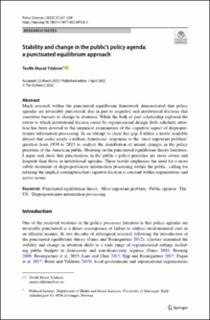| dc.contributor.author | Yildirim, Tevfik Murat | |
| dc.date.accessioned | 2022-06-07T08:34:39Z | |
| dc.date.available | 2022-06-07T08:34:39Z | |
| dc.date.created | 2022-04-20T13:01:03Z | |
| dc.date.issued | 2022-04 | |
| dc.identifier.citation | Yildirim, T.M. (2022) Stability and change in the public’s policy agenda: a punctuated equilibrium approach. Policy sciences, 55, 337-350 | en_US |
| dc.identifier.issn | 0032-2687 | |
| dc.identifier.uri | https://hdl.handle.net/11250/2997629 | |
| dc.description.abstract | Much research within the punctuated equilibrium framework demonstrated that policy agendas are invariably punctuated, due in part to cognitive and institutional frictions that constitute barriers to change in attention. While the bulk of past scholarship explored the extent to which institutional friction varies by organizational design, little scholarly attention has been devoted to the empirical examination of the cognitive aspect of disproportionate information processing. In an attempt to close this gap, I utilize a newly available dataset that codes nearly a million Americans’ responses to the ‘most important problem’ question from 1939 to 2015 to analyze the distribution of annual changes in the policy priorities of the American public. Drawing on the punctuated equilibrium theory literature, I argue and show that punctuations in the public’s policy priorities are more severe and frequent than those in institutional agendas. These results emphasize the need for a more subtle treatment of disproportionate information processing within the public, calling for relaxing the implicit assumption that cognitive friction is constant within organizations and across issues. | en_US |
| dc.language.iso | eng | en_US |
| dc.publisher | Springer Nature Switzerland AG | en_US |
| dc.rights | Navngivelse 4.0 Internasjonal | * |
| dc.rights.uri | http://creativecommons.org/licenses/by/4.0/deed.no | * |
| dc.subject | samfunnsvitenskap | en_US |
| dc.title | Stability and change in the public’s policy agenda: a punctuated equilibrium approach | en_US |
| dc.type | Peer reviewed | en_US |
| dc.type | Journal article | en_US |
| dc.description.version | publishedVersion | en_US |
| dc.rights.holder | © The Author(s) 2022 | en_US |
| dc.subject.nsi | VDP::Samfunnsvitenskap: 200 | en_US |
| dc.source.pagenumber | 337-350 | en_US |
| dc.source.volume | 55 | en_US |
| dc.source.journal | Policy sciences | en_US |
| dc.identifier.doi | 10.1007/s11077-022-09458-2 | |
| dc.identifier.cristin | 2017880 | |
| cristin.ispublished | true | |
| cristin.fulltext | original | |
| cristin.qualitycode | 1 | |

